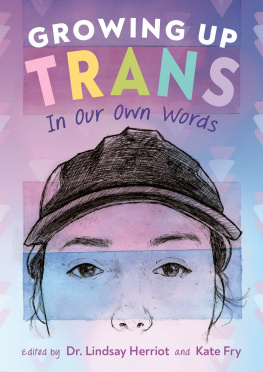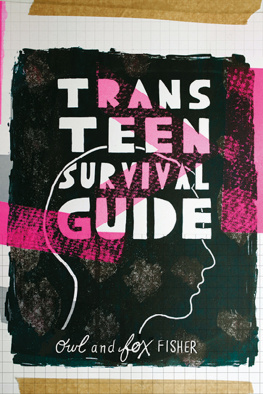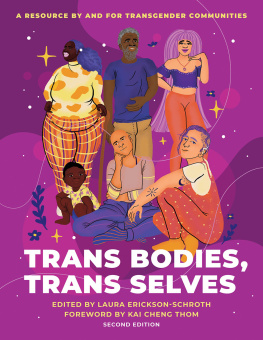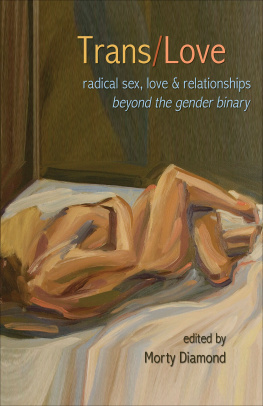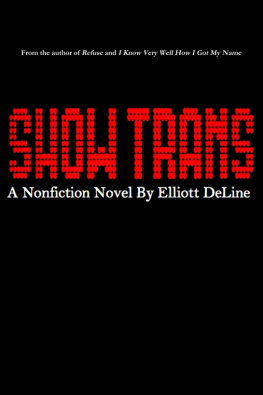Francisco Galarte - Brown Trans Figurations
Here you can read online Francisco Galarte - Brown Trans Figurations full text of the book (entire story) in english for free. Download pdf and epub, get meaning, cover and reviews about this ebook. year: 2020, publisher: University of Texas Press, genre: Home and family. Description of the work, (preface) as well as reviews are available. Best literature library LitArk.com created for fans of good reading and offers a wide selection of genres:
Romance novel
Science fiction
Adventure
Detective
Science
History
Home and family
Prose
Art
Politics
Computer
Non-fiction
Religion
Business
Children
Humor
Choose a favorite category and find really read worthwhile books. Enjoy immersion in the world of imagination, feel the emotions of the characters or learn something new for yourself, make an fascinating discovery.

- Book:Brown Trans Figurations
- Author:
- Publisher:University of Texas Press
- Genre:
- Year:2020
- Rating:4 / 5
- Favourites:Add to favourites
- Your mark:
- 80
- 1
- 2
- 3
- 4
- 5
Brown Trans Figurations: summary, description and annotation
We offer to read an annotation, description, summary or preface (depends on what the author of the book "Brown Trans Figurations" wrote himself). If you haven't found the necessary information about the book — write in the comments, we will try to find it.
Brown Trans Figurations — read online for free the complete book (whole text) full work
Below is the text of the book, divided by pages. System saving the place of the last page read, allows you to conveniently read the book "Brown Trans Figurations" online for free, without having to search again every time where you left off. Put a bookmark, and you can go to the page where you finished reading at any time.
Font size:
Interval:
Bookmark:

Latinx: The Future Is Now
A series edited by Lorgia Garca-Pea and Nicole Guidotti-Hernndez
Brown Trans Figurations
Rethinking Race, Gender, and Sexuality in Chicanx/Latinx Studies
FRANCISCO J. GALARTE

University of Texas Press
Austin
Copyright 2021 by the University of Texas Press
All rights reserved
First edition, 2021
Requests for permission to reproduce material from this work should be sent to:
Permissions
University of Texas Press
P.O. Box 7819
Austin, TX 78713-7819
utpress.utexas.edu/rp-form
Library of Congress Cataloging-in-Publication Data
Names: Galarte, Francisco J., author.
Title: Brown trans figurations : rethinking race, gender, and sexuality in Chicanx/Latinx studies / Francisco J. Galarte.
Description: First edition. | Austin : University of Texas Press, 2021. | Series: Latinx: the future is now | Includes bibliographical references and index.
Identifiers: LCCN 2020029777
ISBN 978-1-4773-2212-3 (cloth)
ISBN 978-1-4773-2213-0 (paperback)
ISBN 978-1-4773-2214-7 (library ebook)
ISBN 978-1-4773-2215-4 (ebook)
Subjects: LCSH: Transgender peoplePolitical activityUnited States. | Mexican AmericansPolitical activity. | TransphobiaUnited States. | Transgender peopleUnited StatesIdentity. | Mexican AmericansEthnic identity. | Sexual minoritiesPolitical activityUnited States. | Sexual minority cultureUnited States. | Queer theory. | Intersectionality (Sociology)
Classification: LCC HQ77.95.U6 G454 2021 | DDC 306.76/8dc23
LC record available at https://lccn.loc.gov/2020029777
doi:10.7560/322123
For the three people whose love has sustained and comforted me: Mom, Dad, and Bernadine
Contents
Acknowledgments
This book has its origins in my hometown of Brawley, California, where I came of age and dreamed of a life I didnt think was possible. As a child, I dreamed of a life that now aligns with the trans life I live today. I grew up not understanding what transgender or transsexual was, and when I finally discovered multiple forms of transsexual and transgender individuals, narratives, politics, and theories as an undergraduate and graduate student, my world shifted. This has its origins in the moment I began my transition, this was when I decided to recuperate and write the subjectivity I share with many others into existence. The book mirrors my own psychic and bodily transformations, a journey marked by fear, uncertainty, pain, loss, and grief, as well as pleasure, happiness, and the excitement of what could be. Many individuals and institutions have been instrumental in my realization of this project.
In 2004 I took a risk and flew to the Midwest to begin graduate school at the University of Illinois at Urbana-Champaign, where I encountered the excitement of intellectual inquiry and where the questions I asked were met with equal excitement. To begin, I must thank my adviser in education, Antonia Darder, who knew exactly how to support me when I didnt know what I needed and who inspired me to always follow and cultivate my pedagogical instincts. I am grateful to Richard T. Rodrguez and Lisa M. Cacho, who mentored me in Latina/o studies; the conversations with them and their work laid the foundation for the kinds of questions I ask as a scholar. I was thankful to be continually supported by the Department of Latina/o Studies, the faculty, fellow Latina/o studies graduate and undergraduate students. While at the university I made long-lasting friendships with Judith Estrada, Gerardo Diaz, Abel Correa, Genevieve Clutario, and Rufina Cortez. And I thank Aid Acosta, without whose friendship I would not have made it through graduate school and whose unconditional support and love continue today.
I was fortunate to spend two years at the University of California, Santa Barbara, as a graduate student in the Department of Chicana and Chicano Studies. While there I was thankful to learn from Chela Sandoval, Horacio Roque Ramirez, Ellie Hernndez, and Barbara Tomlinson. I am grateful to have been able to think with the other graduate students in the program, most especially Eddy F. Alvarez, Cristina Serna, Amber Rose Gonzalez, Ricardo Ortega, William Calvo, Tomas Madrigal, Nicolas Centino, Jessica Lopez Lyman, Jose Anguiano, and Sara Hinojos.
In 2011 I packed up my bags and moved from the Midwest to Tucson, Arizona, to begin my career at the University of Arizona. In my first year as an adjunct I was welcomed by the faculty and graduate students, and I jumped at the opportunity to stay on as a tenure-track faculty member. I am thankful for the support of my colleagues, who created an environment that challenged me intellectually and supported the writing of this book through check-ins, advice, and mentorship. In the Department of Gender and Womens Studies I especially thank Miranda Joseph, Elizabeth Kennedy, Sally Stevens, Susan Stryker, Sandy Soto, Patricia MacCorquendale, Eithne Luibheid, Marcia Klotz, Monica Casper, Judy Temple, and Jennifer Croissant. Other colleagues with whom I have collaborated at the University of Arizona include Michelle Tellez, Jen Hoefle-Olson, Sarah Gonzalez, Laura G. Gutierrez, Nicole Guidotti-Hernndez, Manuel Muoz, Anita Huizar-Hernndez, Kaitlin Murphy, and Lee Medavoi.
I am forever indebted to Eva Hayward and Adam Geary, who read early drafts of the book and offered generous and substantive feedback that in all honesty made me realize I was capable of writing this book. The conversations with both of them about psychoanalysis and transgender studies have forever shaped my thinking about embodiment and desire. I thank them for thinking with me.
I am grateful for my teaching assistants and graduate students, whose labor helped make time for writing this book and whose engagement in graduate seminars and independent studies pushed me in significant ways; my thanks go to Susana Sepulveda, Ruben Zecena, Dylan Blackston, Harrison Apple, Brooke Lober, Alex Barksdale, Scott Bradford, Sav Schlauderaff, Justin Ostrowski, Juan Ochoa, Gloria Negrete-Lopez, Felix Solano Vargas, Elena LAnnunziata, Hannah Kyle, Liz Kinnamon, Alex Karaman, Giramata I, Katherine Freeman, Adrian Flores, Mel Ferrara, Luna Chung, Elizabeth Verklan, and Stephanie Murphy.
Funding for this project included support from the Transgender Studies Research Cluster through a Wellspring Grant, the Institute for LGBT Studies, and the Social and Behavioral Sciences Research Institute. I am thankful to my colleagues in the Transgender Studies Research Cluster, Z. Nicolazzo, Eric Plemons, Max Strassfeld, T. C. Tolbert, and Russell Toomey. I am grateful as well to members of the faculty advisory committee of the Institute for LGBT Studies, Jill Koyama, Kate Hemphill, Ana Cornide, and Spike Peterson.
In 2019 I was fortunate to be awarded a residency at the Feminist Research Institute at the University of New Mexico, where I was warmly received and supported by Amy L. Brandzel, Elizabeth Hutchison, Scarlett Higgins, Kency Cornejo, and Szu-Han Ho. I am honored to join the Department of American Studies and Women, Gender, and Sexuality Studies program at the University of New Mexico in 2020 and am thankful for the support of my new colleagues.
Over the years I have benefited greatly from sharing my work with colleagues I have met as part of the Association for Joteria Arts, Activism, and Scholarship, Anita Tijerina Revilla, Ernesto Martinez, Michael Hames-Garcia, Yovani Flores, Joanna Nuez, Yosimar Reyes, Maya Chinchilla, Jose Manuel Santillana, Audrey Silvestre, and Nadia Zepeda.
Font size:
Interval:
Bookmark:
Similar books «Brown Trans Figurations»
Look at similar books to Brown Trans Figurations. We have selected literature similar in name and meaning in the hope of providing readers with more options to find new, interesting, not yet read works.
Discussion, reviews of the book Brown Trans Figurations and just readers' own opinions. Leave your comments, write what you think about the work, its meaning or the main characters. Specify what exactly you liked and what you didn't like, and why you think so.

